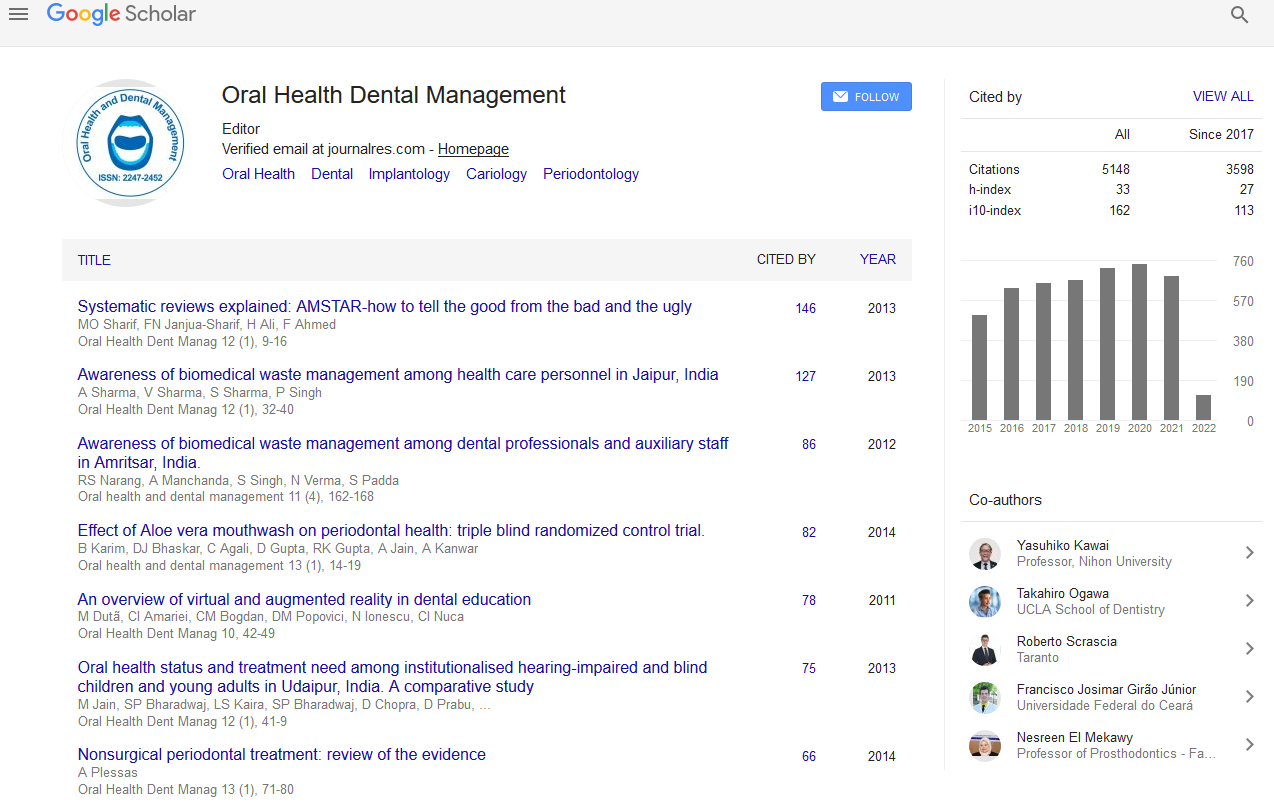Indexed In
- The Global Impact Factor (GIF)
- CiteFactor
- Electronic Journals Library
- RefSeek
- Hamdard University
- EBSCO A-Z
- Virtual Library of Biology (vifabio)
- International committee of medical journals editors (ICMJE)
- Google Scholar
Useful Links
Share This Page
Journal Flyer

Open Access Journals
- Agri and Aquaculture
- Biochemistry
- Bioinformatics & Systems Biology
- Business & Management
- Chemistry
- Clinical Sciences
- Engineering
- Food & Nutrition
- General Science
- Genetics & Molecular Biology
- Immunology & Microbiology
- Medical Sciences
- Neuroscience & Psychology
- Nursing & Health Care
- Pharmaceutical Sciences
Abstract
Oral Health Status in Jordanian Children with Cancer Undergoing Chemotherapy
Arwa I Owais, Mohammad H Al-Birawi, Hala S AL-Rimawi, Suleiman Swaidan, Fareed Haddad
Aim: To assess the oral health status in Jordanian pediatric oncology patients undergoing chemotherapy. Methods: 100 children with cancer undergoing chemotherapy (37 females and 63 males) and age and sex-matched 100 healthy children were examined. Dental caries, plaque, gingival health, soft tissue lesions, dental developmental defects and dental treatment need urgency were assessed. Statistically significant results were determined if P was <5%. Results: Pediatric patients suffering from cancer had statistically significant higher caries in the primary dentition (dmft, dmfs) (P=0.002, P=0.001 respectively), but not in the permanent dentition (DMFT, DMFS) (P=0.361, P=0.281 respectively). No differences were detected in the plaque deposits (P=0.378). Fifteen percent of the study group had healthy gingiva compared to 32% in the control group, the difference was statistically significant (P=0.006). Twenty percent of the oncology patients had soft tissue problems (6 had mucositis and 14 had aphthous ulceration) (P=0.000). Sixteen patients had hypoplastic teeth among the oncology group, while only two children in the healthy group had such defect (P=0.001). Dental treatment need urgency was not statistically significant between the two groups (P=0.219). Conclusions: Compared to healthy children, pediatric patients with cancer and undergoing chemotherapy had higher caries incidence in the primary dentition, but not in the permanent dentition, higher gingivitis index in the upper jaw, higher prevalence of soft tissue lesions including aphthous ulceration and mucositis, as well as higher prevalence of hypoplasia. However, plaque deposits were not statistically significant between the two groups.

